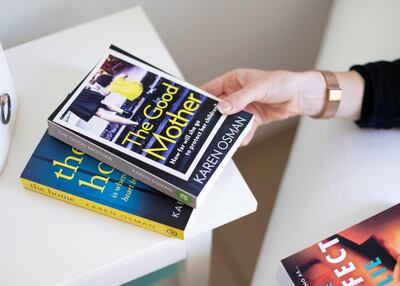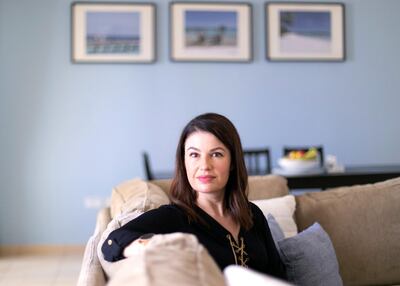British author and entrepreneur Karen Osman has lived in Dubai for 15 years. Ms Osman's debut novel, The Good Mother, won the Montegrappa writing prize at the Emirates Airline Festival of Literature in 2016. She released her third book, The Perfect Lie, last month, and is also the founder of communications agency Travel Ink. Ms Osman, 40, lives in a Jumeirah Beach Residence apartment with husband Fahad, a digital marketeer, and their two sons, aged five and three.
How did your upbringing shape your attitude towards money?
I come from a family where hard work is valued quite highly. To have holidays and new clothes, my parents (my dad a project manager for a pharmaceuticals company, my mum a teaching assistant at a special needs school) worked really hard and I believe this has passed down to my younger brother and me. From a very early age I knew that earning my own money would be my ticket to independence.
Did you have a job while at school?
I started working as a waitress in a restaurant in the Lake District in England in my early teens. I earned £1.75 (Dh8) an hour but I earned good tips too. I remember working one lunchtime on my birthday and a customer gave me a £5 tip.
How much did you get paid for your first job?
My first job after graduation was as an English teacher in Japan at 21. I worked six hours a day for 180,000 yen (Dh6,110) a month, and there were opportunities to do private classes as well. Tokyo is very, very expensive but it is still one of my best jobs and was a decent salary for a graduate. After two years in Tokyo, I spent a year in Sardinia, in Italy, before going to London to work for a year, then here.
Has becoming a business owner and author changed you financially?
Becoming an entrepreneur is a huge change from being an employee. You become very aware of profit and loss, cashflow and budgeting, with people reliant on you for payments. As an author, the shift to online has been brilliant, giving me a passive income from audio and e-books. Writing novels has never been a financial motivation for me though — it’s more a creative pursuit.
Are you a spender or saver?
I’ve been a bit of both, depending on the stage of my life. When I was younger I saved a lot of my wages. At university I spent a lot on socialising and clothes and would travel every summer. There was the hedonistic feel of freedom in my twenties but, when I moved to London, I quickly learnt money disappears. Now I have children, I’m in saver mode. It’s not just about you anymore.
What do you fritter money on?
I think I’d be quite horrified if I calculated how much I spend on experiences with the kids - if you go to soft play, then the cinema, then lunch, you could easily spend a few hundred dirhams in a day as a family of four.

Do you give your kids pocket money?
I plan to start giving my eldest son pocket money in a few months. If he wants to buy the new Toy Story 4 dinosaur he will have to dig into his own money. I got pocket money and it's a powerful tool to teach kids that money doesn't grow on trees.
What is your most cherished purchase?
It does sound a bit shallow but a Dh2,000 Michael Kors handbag - a black day bag that will take my laptop. After the first year running my own business, I thought I should treat myself. I still use it today and it reminds me how hard I worked. Now I’d probably invest in a course but, at the time, it was a very special treat.
Have you ever had a month where you feared you could not pay the bills?
Not in the last 15 years or so. I remember the second year of university when, as students, we moved out into our own rented house. I had to call my mum and dad and ask them for extra cash to pay for the phone bill.
Where do you save?
We have an international savings plan offshore in Singapore for long-term saving and local, high-interest programmes for relatively liquid investments. We win on National Bonds (normally just Dh50) — three or four times a year. When I get a missed call from a number I don’t recognise, I always think I missed the call for the big win. That’s the dream, isn’t it?
Do you prefer paying by credit card or in cash?
I prefer cash but often use a credit card for points for large purchases. I do often find myself without cash and it has got easier in the UAE the last few years to use a debit card, or even a watch or phone, to pay.
Do you budget?
My husband and I sit down at the end of each month with an Excel document and track income, outgoings and calculate what cash is left over. We started doing it a few years ago. We plan the year in advance - for instance, our kitchen remodel.
What has been your best financial investment?
We put a largeish sum into a high-return (16 per cent) six-month bond. If the bond hit its objectives, we would get the interest; if it didn't, the money would be locked in for another six months. We were pretty young at the time, and maybe a bit too daring — but it paid off. I’m not sure we'd do it again though: it was nerve-wracking.
What do you most regret spending money on?
Rent. Compared to my parents, I’m quite late to the table in terms of purchasing property. We bought an apartment here in 2017: it cost Dh2.3 million and took us five to six years to save the 25 per cent deposit. Also, looking back I wish I’d spent less on cheap, frivolous stuff, especially now we’re more aware of the impact of fast fashion.
Does money come into your writing?
I write a lot of psychological thrillers, and characters’ financial status can be quite critical to a storyline. I map details on a spreadsheet — everything from a character’s horoscope to their income bracket and appearance.
Do you have a financial plan for the future?
Yes, in terms of savings and pensions. We have a goal of buying property in the UK but our focus now is education funds for our boys, to give them as many options as possible here, or in the UK or US.
If you won Dh1 million, what would you do with it?
I’d invest 60-70 per cent and consider buying a property, even a small one to rent out, in the UK, possibly Manchester. And I’d redecorate my home office. It’s one of our three bedrooms (the boys share). I’d have a bigger desk, an armchair and footstool. The house is quite masculine, so it would be a feminine oasis with space to read and think.
What would you raid your savings account for?
A holiday or experience - I’m quite a fan of luxury hotels. Earlier this year, when I turned 40, we went to New York. It was a brilliant experience - probably one for which my husband raided our account.


